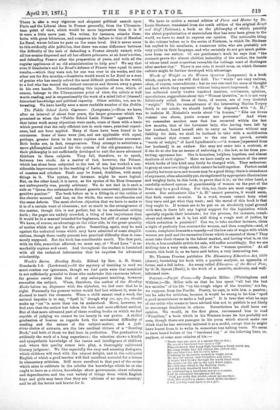Words of 1Veight on the 1Voman Question (Longmans) is a
book which, anyhow, no one will find dull. The " words " are very variety:4 often, of course, contradictory ; but no one can read the mass of thought and fact which they represent without being much impressed. "A. H." has collected nearly twelve hundred maxims, sentiments, opinions, speculations, suggestions about this "Woman Question," as it is not very felicitously called. Some of them, of course, are of very doubtful "weight." With the remembrance of the interesting Martha Torpey fresh in our minds, we should hardly be disposed, with "A. H.;" to italicize M. Michelet's words about "la femme," " Elle oat livrie comma une chose, punie comma une persecute." And when we remember another case that has occurred within the last few months, that of the fortunate lady, who having been left by her husband, found herself able to carry on business without any liability for debt, we shall be inclined to take with a modification the extract that comes next to the one last quoted, certain "words of weight" of Lord Lyndhurst's :—"A woman [separated from her husband] is an outlaw. She may not enter into a contract, or if she do so she has no means of enforcing it ; the law, so far from pro- tecting, oppresses her. She is homeless, helpless, hopeless, and almost destitute of civil rights." Here we have really an instance of the error which books of this kind may fairly be charged with. They endeavour to grasp at once two things which cannot be held together. Perfect social equality between men and women may be a good thing; there is abundance of argument, often admirably put, strengthened by appropriate illustrations and weighty facts, in this book, to prove that it is; on the other hand, a carefully-ordered system of guardianship of women on the part of the State may he a good thing. For this, too, there are most cogent argu- ments. But enthusiasts like "A. H." cannot perceive, it would seem, that both cannot co-exist. In a word, women cannot keep what they have and got what they want ; and the moral of this book is that they ought to. If women are to be put on an absolutely equal ground with men, is there loft any logical support for the legislation which specially regards their interests ; for the process, for instance, round- about and absurd as it is, but still doing a rough sort of justice, by which seduction is punished? Can we, to take another instance, claim a right of perfectly free contract for women, and then complain—and, of course, complaint demands a remedy—of the low rate of wages with which women are paid and the excessive labour which is exacted of them ? They must take their chance in the labour market, and having what is, on the whole, a less available article for sale, will suffer accordingly. But we are drifting into a very wide ocean, this of the "woman question." At all events, this book is, as we have said before, a very interesting one.


































 Previous page
Previous page